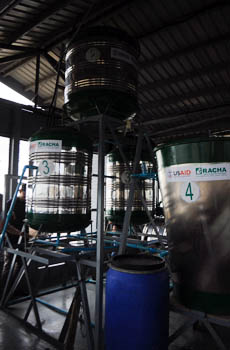Community-Based Water Filtration System

In many communities the primary supply of water is contaminated, and since many families lack access and knowledge of proper treatment methods, this leads to high rates of waterborne mortality and morbidity. With the support of international donors, RACHA established several Biotech Water Filtration Systems (BWFS), a community-based water filtration stations that converts surface water into safe drinking water and provided to low access regions. The stations serves everyone in the community and water is provided free of charge to schools, wats, churches, health centers, VHSGs, and the poorest families in the community.
RACHA has two floating water stations in Siem Reap and Battambang provinces that travel along with the floating villages to meet their safe water needs. Each station can produce 7,200 liters per day. There are four land-based water stations in Siem Reap, Pursat and Banteay Meanchey provinces which provide safe drinking water for communities that lack easy access. RACHA’s innovative BWFS uses improved Slow Sand Filtration technology. It is self-sustaining and the income generated from sale of water is used to cover operation costs and to support hygiene education at rural communities.

Micro Filters at Health Facilities
The health system in Cambodia is poorly resourced in many regards, but safe drinking water at health facilities is a necessity that not all patients are fortunate enough to have. In support of the existing health facilities water systems, RACHA has installed a total of 93 Biotech Micro Filters at 88 health centers within its focus areas to increase access to safe drinking water by health facility workers and patients alike and for infection control. The innovative system uses the Rapid Sand Filtration System and functions under low water pressure; it is simple to operate, requires minimal maintenance costs, and ensures long serviceability. This project is funded by USAID, Later-Day Saint Charities and Japanese Embassy.
 : +855 23 213 724 | +855 23 726 257
: +855 23 213 724 | +855 23 726 257 : office@racha.org.kh
: office@racha.org.kh













